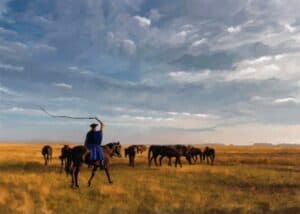Letter from the Editor
Dear Readers,
Welcome to Issue #8 of “Medicine and Meaning,” the literary journal of the University of Arkansas for Medical Sciences (UAMS). The journal is now in its fourth year and continues to thrive with readers and writers from all over the world.

“Hungarian Great Plains,” by Dr. Charles Sandor
In this issue, we once again feature stories related to health, illness, death and dying, and everything in between. Many of these stories come from UAMS students, faculty, staff, and alumni, while others come from friends around the world, and all have been carefully reviewed by our skilled section editors.
Our fiction editors Dr. Faiza Khan and Dr. Humaira Khan selected and edited four captivating stories. The first, “The Final Bill,” humorously recounts the experiences of a family with a parent in a retirement home. It sheds light on the realization that life can be beautiful and joyous, even in a retirement home, or at the end of life, regardless of age. Following that, we have “Happy Birthday, Dr. Napier,” where the author shares a short story based on his novel, Letters of the Arkansas Traveler, about an ophthalmologist who stands up for himself, giving himself the best birthday gift of all: safety and self-protection. Next is “Meaning Beyond Medicine and Death,” a touching story about a young man who strikes up a conversation with a girl undergoing leukemia treatment. She imparts a valuable lesson about life, death, and immortality, emphasizing that feelings are not physical and, therefore, can never die – just like life itself. In “Second Life,” a man is brought to the emergency room for acute intoxication and gets a second chance to relive his experiences, offering a valuable lesson to him and his friends and family.
Our nonfiction editor Mr. Eric Moorehead chose five compelling stories for your enjoyment. “Food Gambles” explores the challenges of a young woman with food allergies, as she navigates the complexities of choosing, selecting, and testing different foods that may trigger reactions. In “How Art Thou Out of Breath,” the main character recounts her struggles with breathlessness and likens it to the Covid-19 pandemic. “The AIDS Quilt” narrates the experiences of an individual who contracted AIDS during the HIV-epidemic and the profound impact it had on his life. “I Am the Age of My Cadaver” features a 65-year-old physician reminiscing about her time as a medical student, reflecting on how she’s now the age of her first cadaver, which had taught her the importance of opening one’s mind just as she had opened her body. In the final nonfiction story, “On Splitting a Pizza Before Saying Goodbye,” the husband of a dying woman shares a pizza with a friend, imparting her wisdom and final stories of life.
In the Poetry section, our editors Mr. Chris Fettes and Ms. Logan Whittington have selected nine distinct poems that touch on various themes, including distracting thoughts, waiting in a hospital waiting room, the biology of PTSD expressed poetically, and much more.
The Images editor Dr. Diane Jarrett accepted photos and paintings of an African landscape, Hungarian plains, a loblolly plant, and two paintings that evoke serenity and autumn reflections respectively.
Dr. Allen Sherman chose six 55-word stories including one reflecting on the power of names, another exploring the urgency of time when a loved one is dying, the power of movie stars in influencing behavior, a portrait of a patient with Parkinson disease, the reality of “circling the drain,” and making space for wonder.
Lastly, our Conversation editor, Ms. Catherine Corless, Esq., edited an engaging interview with Dr. Meghan Breckling, an assistant professor in the College of Pharmacy as interviewed by Abigail Grimes, a student in the UA Little Rock William H. Bowen School of Law. Dr. Breckling was recently awarded a $1 million grant by the U.S. Substance Abuse and Mental Health Services Administration to create a five-year program to combat opioid overdoses. This insightful interview covers Dr. Breckling’s background, grant application, prior work, future, and clinical duties, serving as inspiration for those embarking on service projects for the university.
We extend our heartfelt gratitude to all the editors who have worked diligently to bring this issue to life. We would like to thank all the readers and authors who have contributed to the journal, and we encourage you to consider becoming writers for future issues. Our next issue will be released in March 2024, and we eagerly await submissions that reflect the diverse perspectives of UAMS and beyond.
In the meantime, we hope you thoroughly enjoy this issue.
Paulette Mehta
